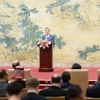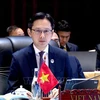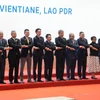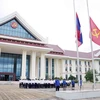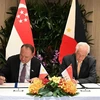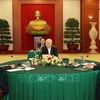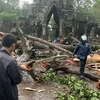Myanmar Vice President Nyan Tun stressed the strategic role of the Greater Mekong Sub-region (GMS) Economic Cooperation Programme in the economic component of ASEAN during the 20 th GMS Ministerial Conference in Nay Pi Taw on September 10.
GMS cooperation will contribute to strengthening the entire region’s overall competitiveness and the long-term development of the ASEAN Economic Community, he said.
He held that GMS economic collaboration is particularly important and has a strategic role in coordinating economic restructuring efforts among GMS members as part of ASEAN as well as the East Asia region at large.
Nyan Tun also cited bilateral affiliations such as the already opened Myanmar-Laos friendship bridge across the Mekong River and the new Asia Road inaugurated this year, which he said will support cross-border trade and facilitate transportation between involved countries.
During the conference, themed “Taking action for inclusive and sustainable development”, the ministers also called for the mobilisation of additional funding to fully implement a 30-billion-USD pipeline of investment and technical assistance projects that will drive growth and infrastructure development in the sub-region.
The GMS Economic Cooperation Programme’s work to improve transport infrastructure, expand energy access, and promote sustainable and inclusive development has resulted in enormous dividends for the sub-region and its people, said ADB Vice-President Stephen Groff.
“Moving forward, the GMS will need to leverage greater resources, particularly private sector funds, to successfully execute its ambitious development agenda,” he said.
The ministers called for accelerated efforts to implement seamless cross-border transport and trade in the sub-region, which along with improvements in power and telecommunications, are key building blocks for the realisation of the ASEAN Economic Community.
Since its inception in 1992, the programme has invested approximately 17 billion USD in projects covering sub-region roads and transportation links, cross-border energy, tourism infrastructure and communicable disease prevention.
The ministers’ remarks on the need for more infrastructure funding follow a recent agreement adopted by the five Mekong nations and Japan to boost industrialisation in the sub-region. The agreement details policies needed to improve cross border trade and develop special economic zones in border areas.
The ministers also endorsed a new framework for urban development in the GMS with greater emphasis on green development, which complements the aims of the pending Sustainable Development Goals.
The GMS comprises Cambodia, China, Laos, Myanmar, Thailand and Vietnam.-VNA



